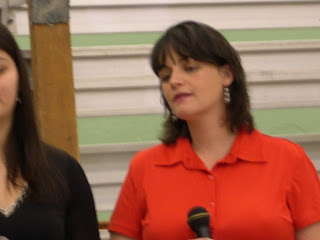
Fear. Terror.
Do these words describe your present state because of loss of a loved one? I know it did mine after our son, Joshua, died by suicide over six years ago. Do I still feel this way from time to time? Yes, but with God's mercy, I passed through and out of the terror over Joshua being gone.
Psalms 56:3 is fitting: "What time I am afraid, I will trust in thee." (KJV)
Hard to practice living that verse? Of course, especially when you've lost a child. I walked around full of terror that first year after Joshua left us. But I didn't stay in that miserable state. We may feel fear during our loved ones' birthdays and the holidays that we experience without them. And we may know terror when their death date rolls around, but all this can be less of a burden.
In time.
This year, my husband and I were not overly sadden at Christmas time. Few tears and sorrow to overwhelm us. Why? We reached out to a community where I spent much of my growing up years. My husband passed out Bibles and the Gospel of John tracks at the town's Christmas dinner feed. At one table, we shared about God's love to a suffering soul. We even got to eat with my dear friend who is still like a mother to me after all these years. We felt blessed by the day.
Something else I've recently come across is a book about writing through your healing process. You do NOT have to be a writer or a published author. You can take up writing at a point in your life when that has never been your intent. It can be words only for your eyes.
The book is entitled, "Writing as a Way of Healing" by Louise DeSalvo. I believe God allowed me to find this book as an aid to my healing process. With God as my foundation, I've been reading DeSalvo's words. I understand I am doing well to write about my feelings after all the major losses in my life.
DeSalvo suggests we write in a journal about an event that has caused us so much sorrow that we can not let it go. Something that keeps us stuck in neutral. Here's a quote from DeSalvo's book: "Engaging in writing, in creative work, then, permits us to pass from numbness to feeling, from denial to acceptance, from conflict and chaos to order and resolution, from rage and loss to profound growth, from grief to joy."
Do you think David understood this when he wrote Psalms? I see David's life poured out onto the pages of our Bible. So, why shouldn't we create our own words of healing? Or paintings of healing? Or woodwork, crafts, sculptures? Why not try it, friends?
Until next time . . . create.
